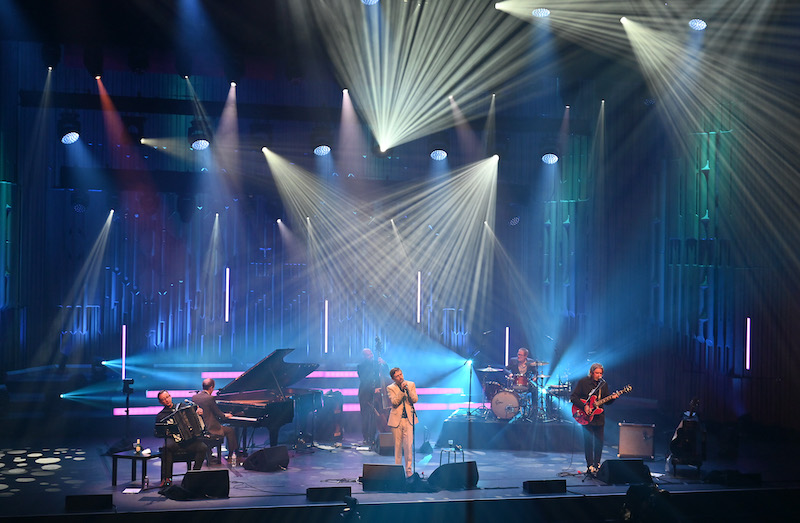The Divine Comedy: Live from the Barbican review – thirty years of great songs | reviews, news & interviews
The Divine Comedy: Live from the Barbican review – thirty years of great songs
The Divine Comedy: Live from the Barbican review – thirty years of great songs
Neil Hannon marks the anniversary with a joyful trawl through his catalogue
If “things” hadn’t intervened, September would have seen the Divine Comedy play a five night residency at the Barbican, playing their entire back catalogue, two albums a night, to mark 30 years since the band was started.
The 30th band anniversary – which has also been marked with the release of a box set that I think I’m obliged to describe as “lavish” – is a bit of a swizz, in that the 1990 iteration of the band lasted only a couple of years and only Neil Hannon (pictured below by Mark Allan) himself has been ever-present since then. Only on 1994’s Liberation did the Divine Comedy’s true identity as the bastard child of Scott Walker, Michael Nyman and early Nineties Britpop settle down, and there have been many swerves and feints since then.

The band, who normally range over a plethora of instruments, stuck to one each, with a slight nod to their being in the classical hall of the Barbican. Keyboardist (and arranger) Andrew Skeet was on grand piano, particularly exhilarating in his “National Express” solo. Simon Little played an acoustic double bass (sometimes bowed, adding another register) while Ian Watson’s accordion (pictured above) offered the most distinctive tinge to the sound. It was all underpinned by the witty drumming of the uber-cool besuited Sean Lock-lookalike Tim Weller.

This became an unintentional encore as Hannon forget it at its planned place in the running order – but was perfect where it ended up. It is a story of a seduction gone wrong, with a perfect twist in the tail, which in the album version builds to a hypnotic orchestral climax. Here, as the chords circled and circled, and the momentum built Hannon simply lay on the front of the stage and let the music swirl over him, giving way to its inexorable force. If Hannon’s songwriting has a fault it is that it can sometimes slip into smugness – but at its best it can’t really be bettered.
The future of Arts Journalism
You can stop theartsdesk.com closing!
We urgently need financing to survive. Our fundraising drive has thus far raised £49,000 but we need to reach £100,000 or we will be forced to close. Please contribute here: https://gofund.me/c3f6033d
And if you can forward this information to anyone who might assist, we’d be grateful.

Subscribe to theartsdesk.com
Thank you for continuing to read our work on theartsdesk.com. For unlimited access to every article in its entirety, including our archive of more than 15,000 pieces, we're asking for £5 per month or £40 per year. We feel it's a very good deal, and hope you do too.
To take a subscription now simply click here.
And if you're looking for that extra gift for a friend or family member, why not treat them to a theartsdesk.com gift subscription?
more New music
 theartsdesk Radio Show 37 - Pete Lawrence of the Big Chill discusses the power of protest music and his new project This Is The Fire
Talking to cultural activist Pete Lawrence – camp outs, singalongs and saving the world
theartsdesk Radio Show 37 - Pete Lawrence of the Big Chill discusses the power of protest music and his new project This Is The Fire
Talking to cultural activist Pete Lawrence – camp outs, singalongs and saving the world
 Album: Sabrina Carpenter - Man's Best Friend
Short but not so sweet
Album: Sabrina Carpenter - Man's Best Friend
Short but not so sweet
 Album: CMAT - EURO-COUNTRY
The flame-headed chanteuse with the comic touch hits pop perfection
Album: CMAT - EURO-COUNTRY
The flame-headed chanteuse with the comic touch hits pop perfection
 Album: The Hives - The Hives Forever, Forever The Hives
No power ballads, no acoustic interludes - just speedy rock’n’roll all the way
Album: The Hives - The Hives Forever, Forever The Hives
No power ballads, no acoustic interludes - just speedy rock’n’roll all the way
 Album: Benedicte Maurseth - Mirra
Haunting, intense evocation of Norway’s uplands and its wildlife
Album: Benedicte Maurseth - Mirra
Haunting, intense evocation of Norway’s uplands and its wildlife
 Album: Nova Twins - Parasites & Butterflies
Exciting London duo turn inward and more introspective with their third album while retaining their trademark hybrid sound
Album: Nova Twins - Parasites & Butterflies
Exciting London duo turn inward and more introspective with their third album while retaining their trademark hybrid sound
 Music Reissues Weekly: The Beatles - What's The New, Mary Jane
John Lennon’s queasy, see-sawing oddity becomes the subject of a whole album
Music Reissues Weekly: The Beatles - What's The New, Mary Jane
John Lennon’s queasy, see-sawing oddity becomes the subject of a whole album
 The Maccabees, Barrowland, Glasgow review - indie band return with both emotion and quality
The five-piece's reunion showed their music has stood the test of time.
The Maccabees, Barrowland, Glasgow review - indie band return with both emotion and quality
The five-piece's reunion showed their music has stood the test of time.
 Album: Blood Orange - Essex Honey
A triumph for the artist who doesn't clamour for attention but just keeps growing
Album: Blood Orange - Essex Honey
A triumph for the artist who doesn't clamour for attention but just keeps growing
 Houghton / We Out Here festivals review - an ultra-marathon of community vibes
Two different but overlapping flavours of subculture full of vigour
Houghton / We Out Here festivals review - an ultra-marathon of community vibes
Two different but overlapping flavours of subculture full of vigour
 Album: Wolf Alice - Clearing
Ten years from their debut, Wolf Alice once again make magic from the familiar
Album: Wolf Alice - Clearing
Ten years from their debut, Wolf Alice once again make magic from the familiar
 Album: Deftones - Private Music
Deftones give us a glimmer of hope, but that's all...
Album: Deftones - Private Music
Deftones give us a glimmer of hope, but that's all...

Add comment